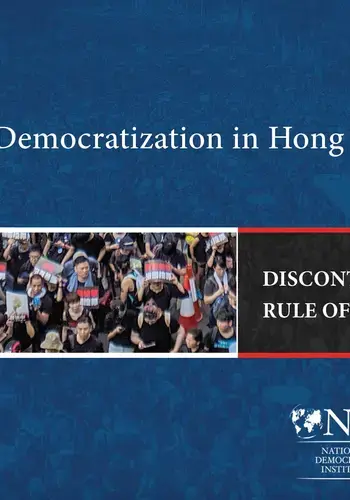In June 2019, a massive and sustained pro-democracy protest movement emerged in Hong Kong, capturing global attention and testing the city’s political foundations. The immediate cause of the crisis was the Hong Kong government’s efforts to push a controversial extradition bill, but, as the movement gained momentum, protesters’ demands extended to larger democratic reform issues. Months of demonstrations were met with increasingly aggressive rhetoric from leadership in Hong Kong and Beijing, who have largely refused to engage in dialogue with the protest movement. Instead, the Hong Kong government has relied on the police to quell the protests, a strategy that has led to further public anger and deeper unrest.
Almost a year later, the protest movement and the Hong Kong government have reached a stalemate. Despite significant political, economic and social costs, the movement has retained internal momentum and political support from a majority of Hong Kong people, as demonstrated by the pan-democrats’ historic victory in November 2019 District Council elections. In this context, there is urgent need for a negotiated resolution. The international community, in particular, has a vital role to play, both in supporting the protest movement’s legitimate democratic aspirations and pressing the Hong Kong government and Beijing to negotiate and avoid further steps that would only deepen the crisis.
Since 1997, NDI has published The Promise of Democratization in Hong Kong assessment reports to raise awareness of challenges to the rule of law and progress toward the city’s democratic development, as outlined in Hong Kong’s Basic Law. In December 2019, a joint research team from NDI and the Georgetown University Center for Asian Law traveled to Hong Kong to meet with 50 stakeholders -- including politicians from across the political spectrum, activists, academics, lawyers and barristers, and business leaders -- to conduct the latest assessment. To bring an end to the political stalemate and social unrest, the seventeenth edition of The Promise of Democratization in Hong Kong provides a range of recommendations to key stakeholders, summarized here:
-
Leadership in Beijing and Hong Kong need to acknowledge the legitimate concerns of the Hong Kong people about the erosion of their rights and the lack of progress on political reform.
-
Beijing should publicly reaffirm its commitment to the One Country, Two Systems governing framework and refrain from any further moves that undermine Hong Kong’s “high degree of autonomy” outlined in the Basic Law.
-
The Hong Kong government should offer to negotiate with representatives from the protest movement and build a framework to increase citizen input.
-
The Hong Kong government should establish an independent statutory commission to investigate widespread allegations of excessive use of force by police.
-
The Hong Kong government should reaffirm its role as the representative body of the Hong Kong people. It should resist Beijing’s interference into Hong Kong’s autonomy and rule of law, and restart the process of democratic reform.
-
In order to leverage broad public support in Hong Kong and the international community, the protest movement should commit itself to non-violence.
-
The people of Hong Kong should continue to tell the story of Hong Kong’s democracy challenges to governments, parliaments, civil society and private sector around the world.
-
The international community, and in particular the United States and United Kingdom governments, should continue to publicly and privately raise concerns about the rule of law in Hong Kong to government officials in Beijing and Hong Kong.
Further, the international community should continue to create opportunities for international non-governmental organizations to build working relationships with Hong Kong counterparts and support nascent civil society efforts in Hong Kong focused on rule of law and democratic development.

